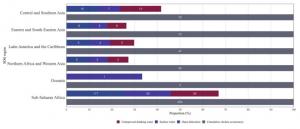Water and sanitation access shapes cholera burden in low- and middle-income countries
FAYETTEVILLE, GA, UNITED STATES, June 24, 2025 /EINPresswire.com/ -- This study evaluated the impact of drinking water, sanitation, and hygiene (WASH) on cholera across 89 low- and middle-income countries. Protective effects against cholera were observed for certain types of improved WASH facilities (e.g., piped water), while harmful effects were noted for unimproved facilities (e.g., open defecation). The disparities in WASH access contributed to inequalities in cholera burden across different regions under the United Nations Sustainable Development Goals (UN SDG) framework.
The United Nations Sustainable Development Goals (UNSDG) include targets for safe drinking water, sanitation, and hygiene (WASH), which are critical in preventing cholera, a persistent health threat in low- and middle-income countries (LMICs). The Global Task Force on Cholera Control (GTFCC) launched a global strategy titled Ending Cholera: A Global Roadmap to 2030, which aims to reduce cholera-related deaths by 90% and eliminate cholera in up to 20 countries by 2030. However, the effect of disparities in WASH access on the unequal cholera burden across geographic regions remains poorly understood.
In a new study published in the KeAi journal Global Transitions, a team of Chinese researchers evaluated the impact of WASH access on cholera and the unequal burden across 89 low- and middle-income countries from 2000 to 2017 under the UNSDG framework.
“Safe WASH are the only long-term and sustainable solutions to effective prevention and control of cholera,” shares first author of the study, Wanqi Wen from Sun Yat-sen University. “Evaluating the impact and attributable burden of WASH on cholera can help cholera-affected areas formulate targeted control strategies tailored to the specific conditions of each country, as outlined in the GTFCC’s Global Roadmap.”
Notably, the proportions of piped water and sewer/septic sanitation negatively relate to cholera, while harmful effects on cholera were noted for proportions of surface water and open defecation. Corresponding author Hualiang Lin, also from Sun Yat-sen University, emphasized that this research highlights the need for maintaining and increasing access to safe WASH in cholera-affected countries.
“Regional disparities in WASH access further contributed to unequal cholera burden. In Sub-Saharan Africa, 25.77 % of cholera were attributed to the high proportion of unimproved drinking water, much higher than 9.09 % in Northern Africa and Western Asia,” explains Lin. “Our findings offer comprehensive information for implementing targeted, local-level control approaches to end cholera globally.”
The authors also emphasize that their estimates of WASH-related prevention fractions offer actionable reference points for countries implementing UN SDG 6 (clean water and sanitation) and the GTFCC’s 2030 Roadmap. “Achieving universal access to improved sanitation could reduce cholera risk by 32.98 % in Sub-Saharan Africa, compared to 7.47 % in Central and Southern Asia,” says Lin. “Scaling up safe WASH access is not just a development goal—it’s a core requirement for eliminating cholera.”
References
DOI
10.1016/j.glt.2025.06.001
Original Source URL
https://doi.org/10.1016/j.glt.2025.06.001
Funding Information
This work was supported the grants from National Key R&D Program of China (2022YFC2305305).
Lucy Wang
BioDesign Research
email us here
Legal Disclaimer:
EIN Presswire provides this news content "as is" without warranty of any kind. We do not accept any responsibility or liability for the accuracy, content, images, videos, licenses, completeness, legality, or reliability of the information contained in this article. If you have any complaints or copyright issues related to this article, kindly contact the author above.

